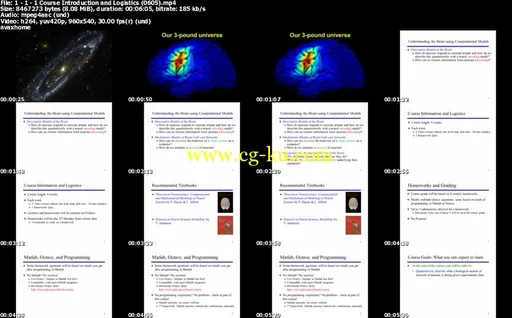
Coursera - Computational Neuroscience
MP4 | 960 x 540 (1.778) @ 30 fps + PDFs | Language: English | 848 MB
Genre: eLearning
Understanding how the brain works is one of the fundamental challenges in science today. This course will introduce you to basic computational techniques for analyzing, modeling, and understanding the behavior of cells and circuits in the brain. You do not need to have any prior background in neuroscience to take this course.
About the Course
This course provides an introduction to basic computational methods for understanding what nervous systems do and for determining how they function. We will explore the computational principles governing various aspects of vision, sensory-motor control, learning, and memory. Specific topics that will be covered include representation of information by spiking neurons, processing of information in neural networks, and algorithms for adaptation and learning. We will make use of Matlab demonstrations and exercises to gain a deeper understanding of concepts and methods introduced in the course. The course is primarily aimed at third- or fourth-year undergraduates and beginning graduate students, as well as professionals and distance learners interested in learning how the brain processes information.
Topics covered include:
1. Basic Neurobiology
2. Neural Encoding and Decoding Techniques
3. Information Theory and Neural Coding
4. Single Neuron Models (Biophysical and Simplified)
5. Synapse and Network Models (Feedforward and Recurrent)
6. Synaptic Plasticity and Learning

发布日期: 2015-01-16